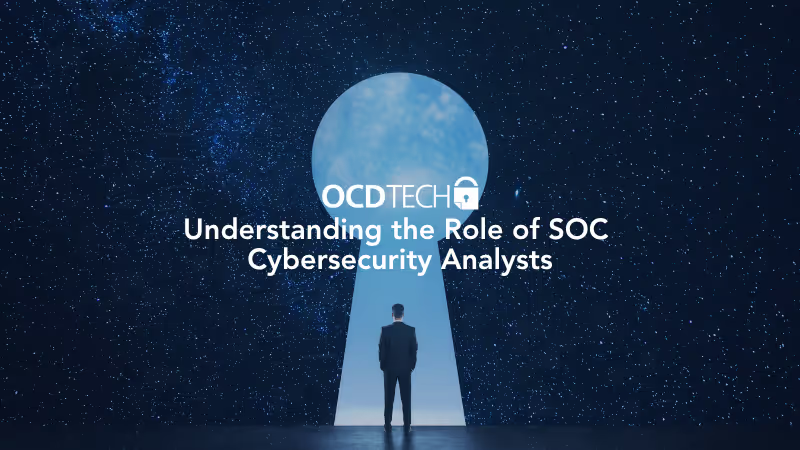By
OCD Tech
•
3
min read

As technology continues to evolve, so do the threats that target it. With increasing cyber threats, companies need to be proactive in protecting their data and systems. Data breaches can result in significant financial losses and damage to a company's reputation. That's where Security Operations Center (SOC) cybersecurity analysts come into play. These experts are the frontline defenders against cyberattacks, ensuring that an organization's digital assets are secure. They are the unsung heroes working tirelessly behind the scenes to keep your data safe.
A Security Operations Center (SOC) is a centralized unit that deals with security issues on an organizational and technical level. It acts as the nerve center of an organization's cybersecurity strategy. The SOC is the hub where security analysts work day and night to monitor, detect, and respond to cybersecurity threats. It serves as both the command center and the battlefield where cyber threats are confronted and neutralized. A SOC is essential for organizations that want to maintain a robust security posture and protect sensitive information. By having a SOC, companies can ensure a proactive approach to cybersecurity.
A fully functional SOC is composed of various components that work together seamlessly. These include technology, processes, and people. Technology involves the use of tools and software that aid in threat detection and analysis. Processes refer to the standardized procedures that analysts follow to handle security incidents. The human element, or the analysts themselves, is the most critical component, as they interpret data and make decisive actions. Each component plays an integral role in ensuring the SOC operates effectively.
The SOC team typically comprises several roles, each specializing in different aspects of cybersecurity. There are Tier 1 analysts who handle initial alerts, Tier 2 analysts who investigate further, and Tier 3 analysts who focus on threat hunting and incident response. Additionally, SOC managers oversee operations and ensure the team functions cohesively. Collaboration among these roles is crucial for efficient threat management and ensures that no aspect of cybersecurity is overlooked.
A SOC provides several benefits that enhance an organization's cybersecurity capabilities. It enables real-time monitoring, ensuring threats are detected and managed promptly. Having a SOC also ensures that there is a coordinated response to incidents, minimizing potential damage. Furthermore, a SOC helps in maintaining compliance with industry regulations and standards, thus avoiding potential legal issues. The presence of a SOC signifies a commitment to safeguarding digital assets and fostering trust with clients and partners.
SOC cybersecurity analysts are the backbone of the Security Operations Center. They are responsible for protecting an organization's digital infrastructure from cyber threats. These analysts play multiple roles that require a blend of technical expertise and analytical skills.
SOC analysts are constantly on the lookout for any unusual activity within the network. They act as the organization's eyes and ears, scanning for potential threats. They analyze logs and network traffic to identify potential threats. Using advanced monitoring tools, analysts can detect anomalies that could indicate a security breach. This vigilant monitoring is crucial for early threat detection and prevention.
When a security incident is detected, SOC analysts jump into action. They follow a structured process to handle the incident effectively:
SOC analysts gather and interpret threat intelligence to anticipate potential attacks and devise defensive strategies. By understanding the tactics, techniques, and procedures used by attackers, they can better protect the organization. Analysts often collaborate with external threat intelligence platforms to enrich their understanding of the threat landscape.
Cybersecurity is ever-evolving, and SOC analysts continuously seek ways to enhance security measures. They conduct regular assessments, recommend improvements, and ensure defenses remain strong against future attacks.
To remain effective, SOC analysts follow key best practices:
The role of SOC analysts comes with challenges:
SOC cybersecurity analysts are essential for safeguarding an organization's digital assets. Their expertise, vigilance, and dedication from the backbone of a robust security posture. By understanding their role, companies can better appreciate the value of investing in a strong Security Operations Center to ensure resilience in the face of evolving cyber threats.

Audit. Security. Assurance.
IT Audit | Cybersecurity | IT Assurance | IT Security Consultants – OCD Tech is a technology consulting firm serving the IT security and consulting needs of businesses in Boston (MA), Braintree (MA) and across New England. We primarily serve Fortune 500 companies including auto dealers, financial institutions, higher education, government contractors, and not-for-profit organizations with SOC 2 reporting, CMMC readiness, IT Security Audits, Penetration Testing and Vulnerability Assessments. We also provide dark web monitoring, DFARS compliance, and IT general controls review.
Contact Info
.svg)
OCD Tech
.svg)
25 BHOP, Suite 407, Braintree MA, 02184
.svg)
844-623-8324
.svg)
https://ocd-tech.com
Follow Us
Videos
Check Out the Latest Videos From OCD Tech!
Services
SOC Reporting Services
– SOC 2 ® Readiness Assessment
– SOC 2 ®
– SOC 3 ®
– SOC for Cybersecurity ®
IT Advisory Services
– IT Vulnerability Assessment
– Penetration Testing
– Privileged Access Management
– Social Engineering
– WISP
– General IT Controls Review
IT Government Compliance Services
– CMMC
– DFARS Compliance
– FTC Safeguards vCISO